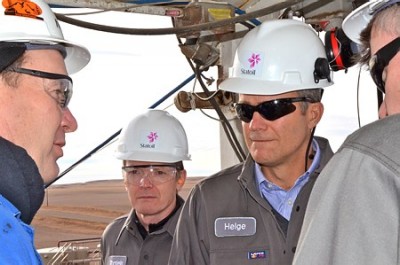Some of Norway’s most powerful oil chiefs, both past and present, have been called in to a new disciplinary hearing in Parliament this month. Top officials at state controlled oil company Equinor and the government oil ministry face more grilling after the state Auditor General referred to them as both “arrogant” and “egotistical.”

The unflattering characterizations of leaders of both Equinor and the ministry to which they’re answerable were uttered by state Auditor General Per-Kristian Foss during a digital seminar organized by PWYP (Publish What You Pay). Foss repeated and elaborated upon earlier harsh criticism detailed in an Auditor General’s report over how the ministry has handled the state’s 67 percent ownership stake in Equinor, formerly known as Statoil.
The findings of a state audit “present a picture of a ministry that has not performed as a professional or informed owner for many years,” said Foss, a former leader of the Conservative Party who has headed the auditor general’s office (Riksrevisjonen) for seven years. Before that Foss served as a finance minister and on the Parliament’s disciplinary committee.
He recalled how it often was said that it was “a bit difficult to see the difference” between the ministry and Statoil/Equinor. They appeared as one entity, Foss said, “and no one wanted to mess with that, because things went so well. The money just poured in.”
‘An incredibly big ego’ around the company
When former Statoil CEO Helge Lund (who also has a history in the Conservative party) greatly expanded the oil company’s international investments during the former left-center government, “Statoil’s culture was so strong that everyone was certain they’d do well,” Foss said. “What lay behind that was an incredibly big ego built up around the company.”
When the company started venturing beyond its own operating area, “the ministry should have raised some questions,” Foss said. “But they didn’t.” And when state financial authorities recommended more detailed reports from operations in the US, Equinor refused. Analysts also wanted the company to stop lumping all international operations together, and break them out for more transparency, but the ministry didn’t support the authorities’ request either.

“That type of arrogance, when you just ignore financial authorities’ recommendation with the response that it’s not common in the oil industry, is hard to find,” Foss said. “To see a ministry not take the recommendation seriously either is also rare.” It was only after newspaper Dagens Næringsliv (DN) reported in detail last spring about Equinor’s huge losses in the US that the company finally changed its reporting routines. “The branch standard was suddenly not standard any longer,” Foss added sarcastically.
Equinor’s outgoing spokesman Bård Glad Pedersen, a former state secretary for the Conservatives, declined comment on Foss’ most recent remarks when contacted by DN. Nor would he comment on a new hearing due to be held later this month by the Parliament’s disciplinary committee. It comes after a hearing last fall held by the Parliament’s energy and environmental committee on much the same subject, but now the topic is the Auditor General’s damning report on the ministry itself, which has been under the political control of Foss’ own Conservative Party since 2013.
The hearing will grill especially current Oil Minister Tina Bru of the Conservatives, who has said she wasn’t aware of Equinor’s huge losses in the US until DN detailed them last spring. It will also raise questions about Equinor’s troubles in Angola, where questions of corruption have arisen, and how the ministry monitors Equinor’s other losses and problems abroad. The company just recently disclosed, for example, that it’s writing off the value of ambitious gas projects off Tanzania as well. It earlier pulled out of polluting tar sands projects in Alberta, Canada and finally gave up highly controversial exploration off Australia after years of protests. The Parliament has also called in two of Bru’s predecessors, current and former management of Equinor/Statoil and leaders of the company’s board in recent years.
More environmental trouble for Equinor, too
The hearings loom just as Equinor landed in even more trouble with state environmental regulators this week. Now the company is accused of generating more than double the amount of gas and chemical emissions it’s allowed on the Aasta Hansteen gas field in the Norwegian Sea, around 300 kilometers west of Bodø.
The state environmental directorate (Miljødirektoratet) is calling it “extremely unfortunate” that Equinor didn’t at least apply for permission to generate more emissions than allowed. Instead regulators found seven violations on and from the Aasta Hansteen platform last fall, including in this case chlorine and nitrous oxide that can harm both the air and waters’ ecosystems.
It’s the latest round of serious problems for Equinor, including a major fire at its Melkøya gas plant outside Hammerfest, fires and emissions violations at its land operations in the US and leaks at its large refinery at Mongstad. Newspaper Dagsavisen editorialized recently that Norway’s largest company seems to have become all but ungovernable, without even some of its own board members fully informed about the extent of losses in the US.
“The ministry has in practice let Equinor do what it wants as long as the money has poured in and the share price has gone up,” wrote Dagsavisen in December. Bru objected and denied the ministry has been too lenient with Equinor over the years. She’ll have a chance to defend the ministry further at the upcoming hearing.
NewsInEnglish.no/Nina Berglund

